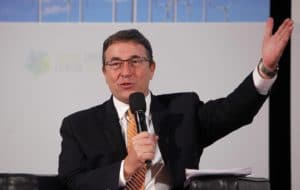New commitments to boost renewable energy and increase access to electricity and clean cooking technologies by 2030 have brought the finance and investment pledged through the United Nations for the energy transition to $1.4 trillion, according to a report released on Wednesday, September 25, 2024.

The third edition of the Energy Compacts Annual Progress Report was launched on Wednesday at the opening of the EnergyNow SDG7 Action Forum, an event convening energy leaders and experts on the margins of the UN General Assembly. The report shows continued growth in Energy Compact voluntary commitments, to be deployed by 2030, aimed at reducing the ranks of 685 million people living without electricity and over 2 billion still cooking with polluting fuels, while setting the world on a climate action trajectory towards net-zero emissions by 2050.
“The initiatives and partnerships highlighted here demonstrate our ability to create impactful change when we unite behind a common goal,” noted the leadership of UN-Energy — Achim Steiner, Administrator of UNDP and Co-Chair of UN-Energy; Damilola Ogunbiyi, the Special Representative of the UN Secretary-General for Sustainable Energy for All and Co-Chair of UN-Energy; and Li Junhua, Under-Secretary-General of the UN Department of Economic and Social Affairs, which serves as the Secretariat for UN-Energy.
“But as we celebrate these milestones, we are reminded that our work is far from over,” the three UN-Energy leaders concluded. “Let this report serve as both an inspiration and a challenge to accelerate our efforts, push beyond our limits, and make the vision of sustainable energy a reality for all.”
The report was prepared by UN-Energy, the coordination mechanism which includes nearly 30 UN and international organizations that work on energy issues, with data compiled and analysed by Sustainable Energy for All (SEforAll).
Scaling up ambition and commitment
The Energy Compacts have been designated a “high impact initiative” supporting the UN Secretary-General’s call to action to achieve the Sustainable Development Goals (SDGs), especially SDG 7: Affordable and Clean Energy, which has shown progress in some areas but at an insufficient pace and scale needed to meet the 2030 deadline. Annual figures released in 2024 showed that the number of people living without electricity increased for the first time in decades, reflecting the need for greater action.
Achieving SDG 7 is also essential for reaching net-zero emissions by 2050 and limiting warming to 1.5 degrees C above average pre-industrial temperatures, a target considered critical for averting ever-worsening climate disasters. It would require sharply scaling up ambition towards a clean energy transition, including additional investments of $23-48 trillion between 2021 and 2030.
The Energy Compacts progress report outlines commitments from governments and the private sector, which include planned spending by countries for both domestic and international action to increase energy access, efficiency and renewables, as well as private sector investment slated in these areas. Since the Energy Compacts were launched in 2021– in connection with the UN High-level Dialogue on Energy — 209 commitments have been registered, including 160 formal submissions and 49 expressions of interest.
Expanding results on energy transition and access
Substantial results have been generated by the Energy Compacts since they began in 2021, according to the report. By providing new and improved electricity connections, Energy Compact proponents have enhanced electricity access for 177 million people, an increase of 48 million people in the past year, but still under the 66 million people who must gain electricity access each year to achieve the goal of 100 per cent access by 2030. Progress on enhancing clean cooking access remains slower, currently at 23 million people, underscoring the need for intensified efforts in this area.
During 2021-2024, $201 billion in finance was mobilised or deployed for Energy Compact actions, nearly a three-fold increase from 2023, with a majority of funds used for installing new renewable power generation, showing a need to scale more finance towards energy access.
The report includes a call to action urging national governments, regions and cities, private companies, financial institutions, UN agencies and civil society organisations to submit their own Energy Compact commitments, through an online process. Plans are underway to use the Energy Compact Action Network as a vehicle to facilitate partnerships and support.
The report also points to the potential linkages between the Energy Compacts and the process by which national governments are preparing to submit stronger climate commitments and plans, in the form of enhanced Nationally Determined Contributions (NDCs) under the Paris Agreement, in the leadup to COP30 in 2025.
